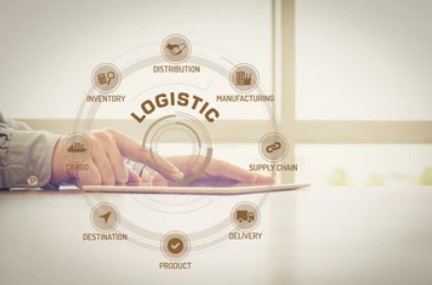Why opt for eLearning for Logistics and Supply Chain?
September 14, 2023
Unquestionably, eLearning's remarkable revolution has swiftly, seamlessly permeated every worldwide nook; ingeniously altering, progressing, and refashioning training and education. Nowadays, eLearning for Logistics and Supply Chain has become a fad too--all thanks to the convenience and swift accessibility learners get from it.
Swiftly adapting to ever-changing market dynamics, eLearning has emerged as a shining beacon; a catalyst for enhanced skill development, and efficiency upgrades. If you're wondering why eLearning for Logistics and Supply Chain and what’s the use, here is the answer to your question.
Effortlessly stepping into the professional realm, eLearning cleverly intertwines a captivating blend of countless perks: swiftly cultivating critical subject expertise, and gracefully integrating essential real-life applications.
Through adept utilization of digital resources in Logistics and Supply Chain Management, savvy industry leaders ingeniously improve cost efficiency, transforming their businesses into lean, yet powerful profit engines.
What's eLearning; Specialties, and Why Use It in Logistics and Supply Chain
eLearning courseware has revolutionized the way we acquire knowledge; intricately blending technology with tailored knowledge delivery, fostering an engaging and interactive learning experience. These impressive elearning courseware shine in unmatched accessibility, and custom-made, persuasive information; interestingly enough, the smooth user engagement they provide is ideal for training purposes.
Undeniably, within the dynamic, essential world of logistics and supply-chain management, eLearning effortlessly delivers a remarkably advantageous edge. With ease, they enable professionals to navigate intricate industry aspects, ensuring they're always ahead; the best part: they achieve peak performance. Truly, eLearning solutions in logistics and supply chain are invaluable treasures--unlocking potential with the mere click of a button.
Decoding The Numerous eLearning Benefits for Logistics and Supply Chain
eLearning platforms can render a myriad of advantages when applied to Logistics and Supply Chain Management and some essential perks are described below.
Accessibility of eLearning-Based Logistic Content: Ingeniously, eLearning powerfully transforms the logistics and supply chain realm, eliminating stubborn barriers, and impressively expanding its global influence. Specifically, the availability of eLearning training content at some clicks of a few buttons to a worldwide audience effortlessly unites industry experts and aspiring professionals, fostering knowledge transfer internationally.
Moreover, unrestricted access to resources anytime, anywhere, encourages on-the-go learning; think of it as carrying an all-encompassing supply chain guide in your pocket.
Cost-effectiveness: Worth its weight in gold, eLearning undoubtedly ushers in an era of cost-effectiveness for both logistics and supply chain businesses. Surprisingly, by lowering training costs, companies strategically streamline budget distribution processes, creating a win-win situation for enthusiastic businesses and their diligent employees.
Additionally, biding costly travel expenses goodbye enables organizations to optimize resources while still ensuring high-quality training; after all, why break the bank when you can learn from the comfort of your own home?
Self-Paced Learning for Individuals: Self-paced learning enables individuals to seamlessly juggle work and personal commitments while acquiring new skills; no longer shackled to rigid schedules, employees are free to learn when opportunities arise.
Example: A warehouse manager who wants to improve the efficiency of their inventory management system may enroll in a self-paced eLearning course on Warehouse Management Systems (WMS). Effortlessly accessing the course content at their convenience, they can significantly boost productivity without hampering daily operations.
Customizable Courses to Suit Company Needs: Customizable eLearning courses on Logistics and Supply Chain Management can cater to a company's specific needs like a well-tailored suit; a highly-targeted educational experience that ensures optimal results for both the individual and the organization.
Standardized Materials for All Employees: Through the use of standardized eLearning materials in the Logistics and Supply Chain Management sector, employees across an organization can enjoy an unwavering foundation of knowledge.
Furthermore, regular updates to course content maintain the pulse of industry trends; like gardeners meticulously pruning their plants, eLearning platforms ensure employees remain sharp, informed, and equipped to tackle challenges head-on.
For example: A global logistics company implements eLearning modules about international shipping regulations and customs clearance procedures. By utilizing standardized eLearning resources, employees everywhere can master complex processes effortlessly; consequently, smoother global operations and superior team synchronization ensue.
Implementing eLearning in Logistics and Supply Chain Management
To implement eLearning in Logistics and Supply Chain Management, there are three essential steps to follow, explained hereunder:
A. Identifying Target Audience (In Logistics and Supply Chain Departments) Along With Learning Objectives
B. Understanding and Then Choosing the Right Elearning Platform for Professionals
C. Developing Elearning Courses Tailored to the Organization’s and Trainees’ Learning Needs
A. Identifying Target Audience (In Logistics and Supply Chain Departments) Along With Learning Objectives: Heedfully comprehending your aspiring learners' distinct profiles, impressive abilities, and ambitious dreams, facilitates fashioning customized, captivating, and potent training courseware. Take, for instance, seamlessly blending relevant case studies or fascinating lifelike scenarios into the training module, effectively captivating trainees through relatability and appeal.
B. Understanding and Then Choosing the Right Elearning Platform for Professionals: Elegantly exploring the vast array of enticing eLearning platforms paves the path for logistics aficionados to meticulously pick the perfect route toward stellar accomplishments.
Thoughtful comparison shopping may include assessing diverse aspects such as user-friendliness, analytics capabilities, and compatibility with company infrastructure.
As an illustration, a platform designed specifically for logistics training--equipped with virtual reality simulations--could prove truly advantageous for honing skills related to warehouse management.
C. Developing Elearning Courses Tailored to the Organization’s and Trainees’ Learning Needs: Effortlessly sync your engaging eLearning courses, skillfully tailored for unique organizational and trainee needs in logistics, supply chain departments.
Adroitly weave together elements such as strategically-placed real-life case studies, interactive modules that encourage problem-solving acumen, along with ample opportunities for professional growth via upskilling or reskilling. Tailoring courses around company-specific intricacies or addressing potential bottlenecks equips learners with relevant knowledge transferable to their daily tasks.
Conclusion
eLearning for Logistics and Supply Chain Management offers a high degree of flexibility and convenience for the learners. Impressively, it permits tailored, engaging learning experiences and fosters seamless, worldwide teamwork effortlessly. Significantly, this cleverly aids companies in effortlessly keeping up with industry trends, ultimately boosting workplace efficiency and productivity remarkably.
If you want to create eLearning solutions for Logistics and Supply Chain Management professionals, one name worth considering is VK Creative Learning as they have the expertise. A specialist in offering customized, industry-specific solutions, they brilliantly address diverse corporate needs, ensuring remarkably successful outcomes. Remarkably, VK Creative Learning dedicatedly offers constant, welcoming assistance, ensuring all queries of the clients are addressed.
Recent Blogs




